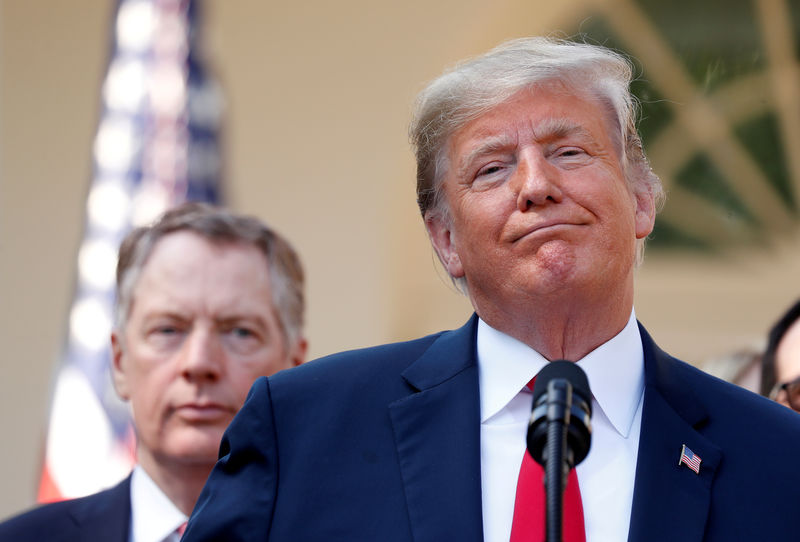 © Reuters. FILE PHOTO: U.S. President Trump discusses trade deal in the Rose Garden of the White House in Washington
© Reuters. FILE PHOTO: U.S. President Trump discusses trade deal in the Rose Garden of the White House in WashingtonBy Humeyra Pamuk and P.J. Huffstutter
(Reuters) – Chuck Wirtz voted for Donald Trump in the 2016 election, inspired by the then-political outsider, but the veteran Iowa hog farmer now has buyer’s remorse as the U.S. Republican president’s trade policy exacts a heavy toll on his business.
Wirtz, 56, estimates the tariffs resulting from the U.S. trade war with China and other nations have cost him $200,000 this year and forced the liquidation of part of his farm in northwestern Iowa.
“I was obviously wrong and I regret my vote,” said Wirtz, who says he is undecided ahead of the Nov. 6 midterm elections that will decide whether Republicans continue to control the U.S. Congress.
Some of the nation’s 3.2 million farmers and ranchers, traditionally staunch Republicans, are wavering in this election because of the trade dispute with China, the main buyer of U.S. soybeans and pork, interviews with nearly two dozen farmers showed.
Those interviews and a survey of 2,454 farmers by trade publication Farm Journal also point to a surprising generational split in agricultural areas. While younger producers largely believe in Trump’s pledge to cut a better trade deal with China and his administration’s patriotic appeal for short-term sacrifice, older farmers recall past economic crises and the years of work involved in opening the Chinese market.
Veteran farmers worry they will not be able to recover from a prolonged dispute with the world’s other economic superpower and are concerned the downturn will take too big a bite out of their retirement savings.
Barry Bean, a Missouri cotton marketer whose family sells crops, said that older producers have been cautioning their younger peers about the longer-term risks of the trade battle.
“They’re saying, ‘Look, I’ve taken two or three for the team in the past. We can’t keep taking one for the team.’”
A Reuters/Ipsos poll found that about 53 percent of registered voters in rural areas approved of Trump as of last month. Farm Journal found that some 70 percent of farmers had voted for Trump and 52 percent found him favorable as of August. However, 61 percent of farmers under 45 favored the president while only 40 percent over 65 did.
Overall in the United States, 55 percent of voters over the age of 55 supported Trump in 2016, according to the Reuters/Ipsos 2016 Election Day poll. Only 30 percent of voters under 24 and 38 percent of those aged 25-34 voted for the president.
Democrats, who have high hopes to win back control of the U.S. House of Representatives, see the changing tide in the farm belt as possibly boosting their chances in areas that Trump won in 2016 but are now seen as toss-ups.
They would need to gain at least 23 of the House’s 435 seats to have a majority in the chamber, which would enable them to block at least part of Trump’s agenda. Recapturing the Senate is considered far more difficult.
Two of the four House races in Iowa, the top corn producing state, are considered up for grabs. Democrat Abby Finkenauer has been hitting the trade issue hard as she vies to oust Trump ally and U.S. Representative Rod Blum in one of the districts.
In Kansas, the nation’s top wheat producing state, the Kansas Farm Board took the unusual step of declining to endorse a candidate for governor after Republicans nominated staunch Trump ally Kris Kobach.
Congressional election battlegrounds interactive graphic – https://tmsnrt.rs/2OqGizy
‘ANOTHER YEAR OR SO’
Political divisions are prompting debates in Republican farm families like that of Donald Schexnayder, 57, who farms corn with his two brothers in Louisiana.
“I have one brother who’s not sure about the president, and the other that is very sure that what he’s doing is right,” Schexnayder said.
The Trump administration has tried to sweeten its relationship with farmers in recent months with a $6 billion farm aid package meant to compensate them for markets that were lost due to the trade wars.
Farmers started receiving checks in September, and the U.S. Agriculture Department has promised more aid for the end of the year.
Last month, Trump, who has embraced an “America First” policy aimed at boosting jobs and reducing U.S. trade deficits, promised to expand domestic sales of corn-based ethanol, a key market for Iowa farmers.
Fears that other markets could be lost also eased after the trilateral trade deal signed by the United States, Canada and Mexico on Oct. 1. U.S. corn and dairy farmers, in particular, had fretted about the prospect of a North American trade war.
Nevertheless, a study by economists at Perdue University in Illinois this week showed the retaliatory tariffs imposed by Canada and Mexico during the trade negotiations would cause U.S. agricultural exports to decline by at least $1.8 billion annually, outweighing market access improvements it said were worth $450 million.
U.S. farmers, however, remain most worried about trade with China, which last year bought 60 percent of U.S. soy and has virtually halted purchases this year.
“He probably should have gotten Mexico and Canada, get that deal done and then went after China,” said Curt Mether, a 63-year-old corn and soybean farmer in Iowa, referring to Trump.
Mether said he had voted for Trump and would vote Republican next week, partly because of alignment on social issues like abortion, but added that he could reevaluate Trump ahead of the 2020 presidential election.
“We’ll be willing to put up with him for a while, I’d say another year or so. If he doesn’t get the negotiations turned around by the time he himself is up for election, then we’ll definitely reassess,” Mether said.
Source: Investing.com



























